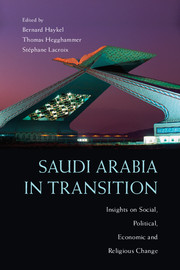4 - Enforcing and Reinforcing the State’s Islam
The Functioning of the Committee of Senior Scholars
Published online by Cambridge University Press: 05 January 2015
Summary
The historical alliance that was established between Muhammad b. ‘Abd al-Wahhab (d. 1792) and Muhammad b. Su‘ud (d. 1765) and gave birth to the Saudi state was accompanied by a “division of labor” between the political authority and the religious authority. Ibn ‘Abd al-Wahhab, his descendants, and his disciples inherited the socio-religious domain, while Ibn Su‘ud and his successors would monopolize the political domain. This theoretically laid the ground for the existence of two distinct spheres, apparently autonomous. Yet this was only apparent, for during the entirety of Saudi-Wahhabi history, these spheres have overlapped, each vying for “control” over the other.
During the second half of the eighteenth century, the charismatic figure of Ibn Abd al-Wahhab, the founder of the Hanbali-Wahhabi movement, dominated the politico-religious domain of central Arabia and its periphery. However, this pattern was reversed during the nineteenth century with the advent of the second Saudi state, as a consequence of the state’s fiscal monopoly, claim to legitimate violence, and active religious policy. This desire to seize power, exerted by the political sphere over the religious sphere, was accelerated after the final consolidation of the Saudi state under King ‘Abd al-‘Aziz (1902–53) in 1932 and with the influx of oil revenues.
- Type
- Chapter
- Information
- Saudi Arabia in TransitionInsights on Social, Political, Economic and Religious Change, pp. 48 - 68Publisher: Cambridge University PressPrint publication year: 2015
References
- 2
- Cited by



